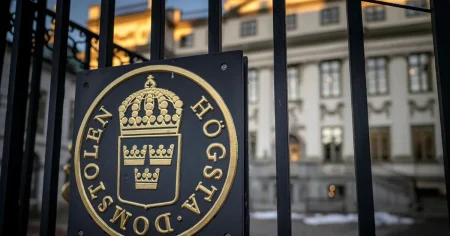1. Enhanced Witness Protection and Hotel Deregulation:
Starting this year, witnesses in Sweden can testify anonymously in cases involving suspected crimes punishable by at least two years in prison. This measure aims to protect witnesses and their close relatives from potential threats or acts of revenge, ensuring greater cooperation with law enforcement and facilitating the pursuit of justice. This anonymous testimony provision applies to both police investigations and court proceedings where a demonstrable risk of serious reprisal exists. Concurrently, the government has deregulated the hotel and guesthouse industry, eliminating the need for specific operating permits. Instead, prospective hoteliers and guesthouse operators will simply notify the police of their intention to commence business, streamlining the process and reducing administrative burdens.
2. Waste Management and Electric Vehicle Infrastructure:
New environmental regulations mandate the separate collection and sorting of textile waste. This includes clothing, home textiles, upholstery, textile bags, and accessories. Both households and businesses must comply with this requirement, depositing their textile waste at designated municipal collection points. This initiative aims to enhance textile recycling and reduce landfill waste. In parallel, new regulations aimed at promoting electric vehicle adoption require non-residential heated buildings with more than 20 parking spaces to install at least one charging point for electric vehicles. This requirement extends to both new constructions and existing buildings, although the charging points are not mandated for public access. This move aims to steadily increase the availability of charging infrastructure, supporting the transition to electric mobility.
3. Reporting Requirements for Parental Leave and Child Welfare:
Employers will now be required to submit monthly reports to the Swedish Tax Agency regarding employees who have taken parental leave or time off to care for a sick child. This reporting obligation aims to improve oversight of parental leave and childcare provisions, ensuring accurate disbursement of benefits and monitoring compliance. Simultaneously, significant amendments to the Parental Code strengthen the protection of children from violence and other forms of abuse. The revisions prioritize the child’s best interests in matters of custody, living arrangements, and visitation rights. Particular attention is given to assessing and mitigating the risk of violence or abuse towards the child or other family members, representing a crucial step towards enhancing child welfare and safety.
4. Tax Adjustments and Loan Restrictions:
Several tax modifications are being implemented. Taxes on gasoline and diesel are being reduced, providing some relief to consumers facing rising fuel costs. The job tax deduction is being enhanced, particularly benefiting those with higher incomes as the phase-out of the deduction for high earners is being removed. Pensioners will also see a decrease in their tax burden. However, the government is simultaneously tightening regulations on unsecured loans, often referred to as "blancolån." The tax deductibility of interest payments on these loans will be gradually phased out, with only 50% of the interest being deductible in the coming year. By 2026, the interest on blancolån will be entirely non-deductible. This measure aims to discourage excessive borrowing and promote responsible financial practices.
5. Renovation and Home Service Deductions:
The maximum deduction limit for home renovation expenses (ROT deduction) is reverting to 50,000 SEK, after a temporary increase to 75,000 SEK. The separate deduction limits for renovation and home services (RUT deduction) are also being merged back into a single combined limit of 75,000 SEK for both. This means homeowners can claim a maximum combined deduction of 75,000 SEK for eligible renovation and home service expenses. This adjustment aims to maintain a sustainable level of government support for home improvement while managing overall expenditure.
6. Summary of Key Changes:
These legislative and regulatory adjustments reflect a multifaceted approach to governance, addressing issues ranging from witness protection and child welfare to environmental sustainability and financial regulation. The changes aim to enhance justice system effectiveness, streamline business operations, promote environmentally responsible practices, and refine tax and social benefit systems. While some measures, such as the tax reductions, may offer immediate relief to certain segments of the population, others, like the phased reduction of interest deductibility on unsecured loans, will have a more gradual impact. Overall, these changes signify a continuous effort to adapt regulations and policies to the evolving needs of Swedish society.














